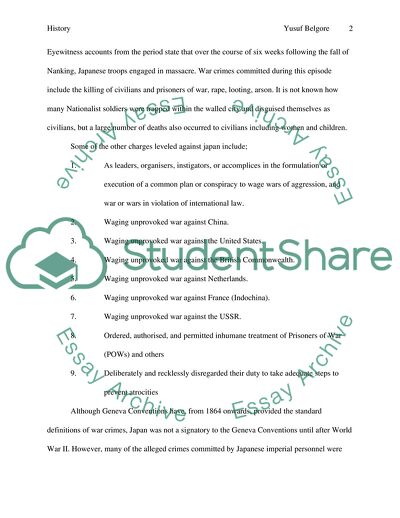
- Home
- Free Samples
- Premium Essays
- Editing Services
- Extra Tools
- Essay Writing Help
- About Us
- Studentshare
- Subjects
- Miscellaneous
- History (Fifteen Year War)
History (Fifteen Year War) - Essay Example

- Subject: Miscellaneous
- Type: Essay
- Level: Masters
- Pages: 4 (1000 words)
- Downloads: 0
- Author: ashton56
Extract of sample "History (Fifteen Year War)"
rld War II was the first major conflict in history in which the victors carried out trials and punishment of thousands of persons in the defeated nations for crimes against peace and crimes against humanity, two new and broadly defined categories of international crime." A crime against peace, in international law, consists of starting or waging a war against the territorial integrity, political independence or sovereignty of a state, or in violation of international treaties, agreements or (legally binding) assurances; A crime against humanity is a term in international law that refers to acts of murderous persecution against a body of people, as being the criminal offence above all others.
International relations scholars have broadly defined "crimes against humanity" as acts so grave, on a scale so large, that their very execution diminishes the human race as a whole. These crimes were allegedly committted in instances as the Nanjing massacre, and generally waging a war against humanity. The Nanjing masacre refers to the widespread atrocities committed by the Imperial Japanese Army in and around Nanking (now called Nanjing), at that time the capital of China, after it fell to Japanese troops on 13 December 1937.
Eyewitness accounts from the period state that over the course of six weeks following the fall of Nanking, Japanese troops engaged in massacre. War crimes committed during this episode include the killing of civilians and prisoners of war, rape, looting, arson. It is not known how many Nationalist soldiers were trapped within the walled city and disguised themselves as civilians, but a large number of deaths also occurred to civilians including women and children. Although Geneva Conventions have, from 1864 onwards, provided the standard definitions of war crimes, Japan was not a signatory to the Geneva Conventions until after World War II.
However, many of the alleged crimes committed by Japanese imperial personnel were also violations of the
...Download file to see next pages Read MoreCHECK THESE SAMPLES OF History (Fifteen Year War)
American History - Civil War Controversy
Thirty Years War
History (Fifteen Year War in Asia)
The actual content of the Fifteenth Amendment
History of the United States
Themes Messuds works
Japan in the Fifteen-Year War
A History of Tesco: the Rise of Britain's Biggest Supermarket

- TERMS & CONDITIONS
- PRIVACY POLICY
- COOKIES POLICY